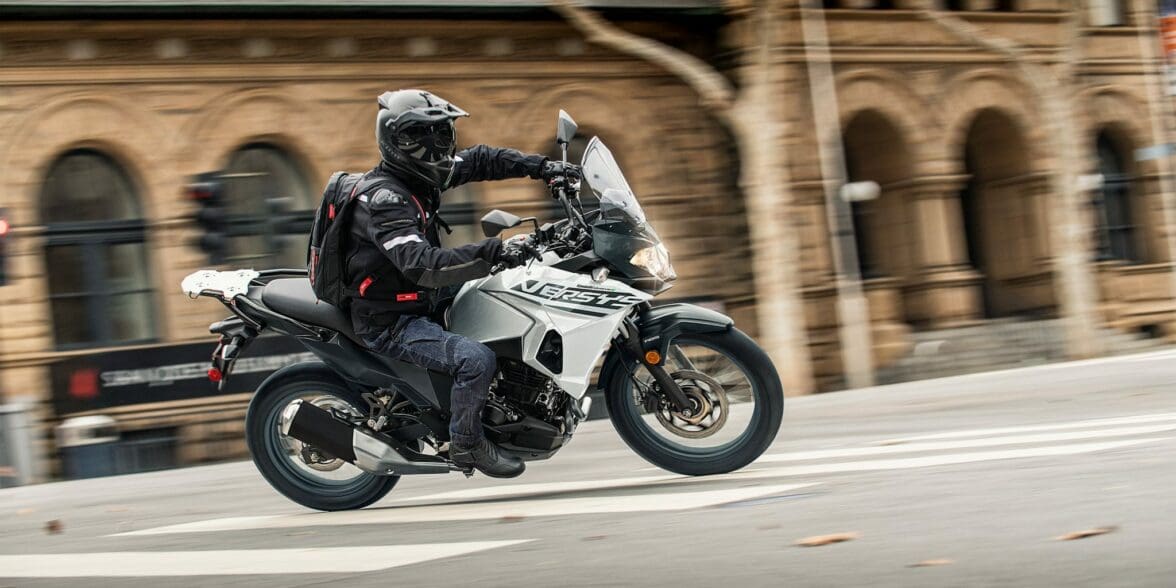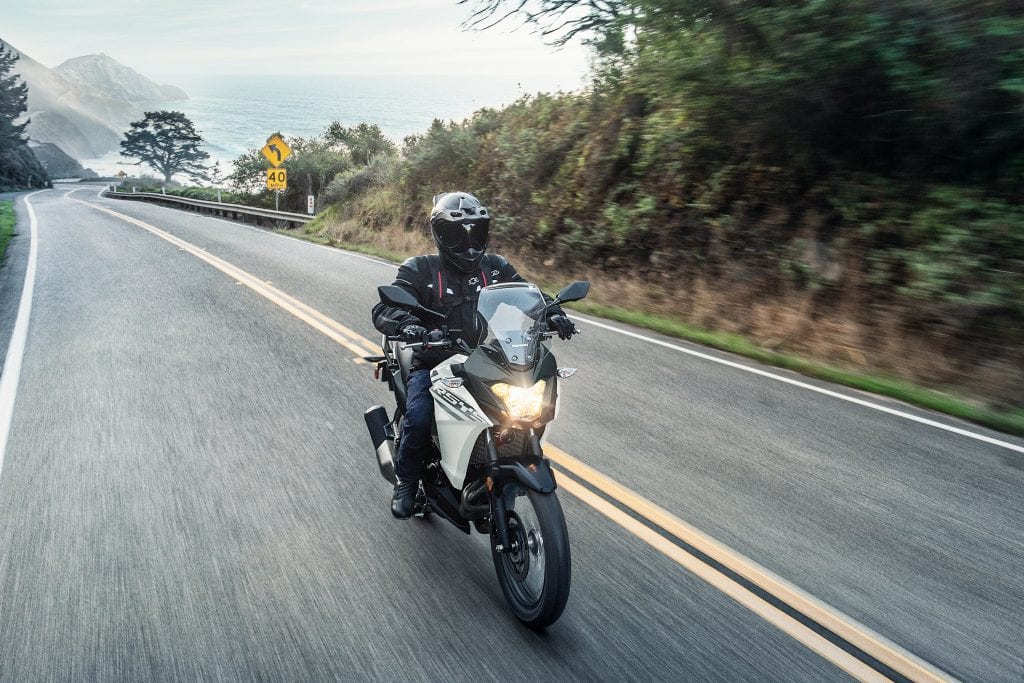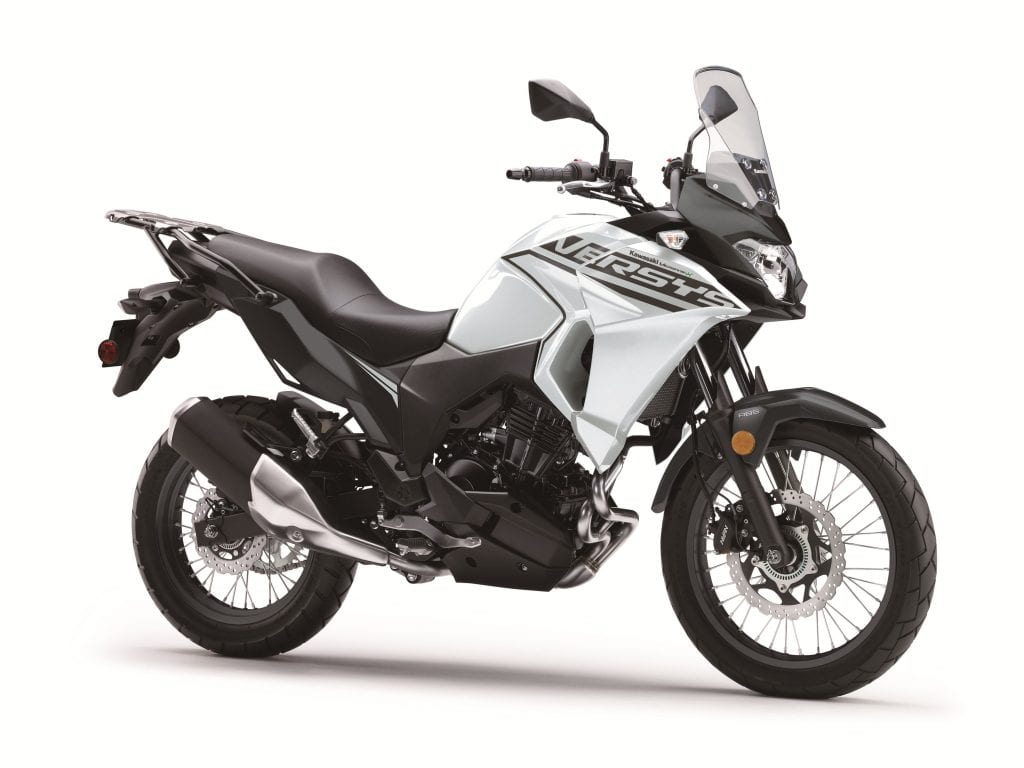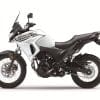2020 Kawasaki Versys-X 300
Contents
The 2020 Versys-X 300 is Kawasaki’s city adventure motorcycle, designed mostly for city roads and internal freeways, with some light ability to do some adventure touring outside of the city limits. Powered by a 296cc DOHC liquid cooled parallel twin, the Versys-X 300 produces 40 crank HP and 19 lbs-ft of torque. This amount is perfectly acceptable as the motorcycle has a wet weight of only 386 lbs.
The Versys-X 300 features a low seat height paired with a high front cowling and windshield to keep the rider as close to the center of gravity as possible while also eliminating wind noise and buffeting at highway speeds. As well, optional handguards help keep your hands warm, and a Kawasaki quick mount system is installed on the rear, allowing for your own saddlebacks or Kawasaki hard saddlebags to be installed.
The 2020 Kawasaki Versys-X 300 non-ABS starts at $5,499 US, while the ABS version starts at $5,799 US/$6,699 CA
On this page: we’ve curated specs, features, news, photos/videos, etc. so you can read up on the new Kawasaki Versys-X 300 in one place.
Model Overview
General Info
- Price: $5,799 US/$6,699 CA
- Key Features:
- Abs (Anti-lock Brake System)
- Economical Riding Indicator
- LED Lighting
Key Specs
- Engine type: 296cc, 4-stroke, 2-cylinder
- Power: 40 Hp
- Wet weight: 385 lb
- Seat height: 32.1 in
Key Competitors
- BMW G310 GS
- KTM 390 Adventure
- Honda CB500X
2020 Kawasaki Versys-X 300 Specifications
ENGINE |
||
| Engine | 296cc, -stroke, 2-cylinder, DOHC, liquid-cooled | |
| Power | 40 Hp | |
| Bore x Stroke | 62.0mm x 49.0mm | |
| Compression Ratio | 10.6:1 | |
| Fuel System | DFI® with 32mm throttle bodies (2) | |
| Starter | Electric | |
| Lubrication | Forced lubrication, wet sump | |
DRIVETRAIN |
||
| Clutch | Wet multi-disc, manual | |
| Transmission | 6-speed, return shift | |
| Final Drive | Sealed chain | |
CHASSIS |
||
| Suspension Front | Telescopic fork/5.1 in | |
| Suspension Rear | Uni-Trak® swingarm/5.8 in | |
| Brakes Front | Single Disc, ABS | |
| Brakes Rear |
Single Disc, ABS
|
|
| Tires Front | 100/90-19M/C 57S | |
| Tires Rear | 130/80-17M/C 65S | |
| Fuel Tank Capacity | 17 L (4.5 US gal.) | |
| Color | Pearl Blizzard White/Metallic Matte Carbon Gray | |
ELECTRICAL |
||
| Ignition | TCBI with digital advance | |
| Spark Plugs | ||
| Headlight | LED | |
| Tail Light | LED | |
DIMENSIONS |
||
| Overall Length | 85.4 in (2,170 mm) | |
| Overall Width | 33.9 in (850 mm) | |
| Overall Height | 54.7 in (1,390 mm) | |
| Wheelbase | 57.1 in (1,450 mm) | |
| Ground Clearance | 7.1 in (180 mm) | |
| Seat Height | 32.1 in (815 mm) | |
| Curb Weight | 385 lbs (175 kg) | |
WARRANTY |
||
| Warranty | 12 Month Limited Warranty | |
| Extension | ||
2020 Kawasaki Versys-X 300 Features
Assist & Slipper Clutch
Based on feedback from racing activities, the Assist & Slipper Clutch uses two types of cams (an assist cam and a slipper cam) to either drive the clutch hub and operating plate together or apart.
Under normal operation, the assist cam functions as a self-servo mechanism, pulling the clutch hub and operating plate together to compress the clutch plates. This allows the total clutch spring load to be reduced, resulting in a lighter clutch lever feel when operating the clutch.
When excessive engine braking occurs – as a result of quick downshifts (or an accidental downshift) – the slipper cam comes into play, forcing the clutch hub and operating plate apart. This relieves pressure on the clutch plates to reduce back-torque and helps prevent the rear tire from hopping and skidding. This race-style function is particularly useful when sport or track riding.
Dual Throttle Valves
Late-model sport bikes often use large-bore throttle bodies to generate high levels of power. However, with large diameter throttles, when a rider suddenly opens the throttle, the unrestricted torque response can be strong. Dual throttle valve technology was designed to tame engine response while contributing to performance.
On models with dual throttle valves, there are two throttle valves per cylinder: in addition to the main valves, which are physically linked to the throttle grip and controlled by the rider, a second set of valves, opened and closed by the ECU, precisely regulates intake airflow to ensure a natural, linear response. With the air passing through the throttle bodies becoming smoother, combustion efficiency is improved and power is increased.
Economical Riding Indicator
Using high-precision electronic control for engine management, Kawasaki models can achieve a high level of fuel efficiency. However, fuel consumption is greatly affected by throttle use, gear selection, and other elements under the rider’s control. The Economical Riding Indicator is a function that indicates when current riding conditions are consuming a low amount of fuel. The system continuously monitors fuel consumption, regardless of vehicle speed, engine speed, throttle position and other riding conditions. When fuel consumption is low for a given speed (i.e. fuel efficiency is high), an “ECO” mark appears on the instrument panel’s LCD screen. By riding so that the “ECO” mark remains on, fuel consumption can be reduced.
While effective vehicle speed and engine speed may vary by model, paying attention to conditions that cause the “ECO” mark to appear can help riders improve their fuel efficiency – a handy way to increase cruising range. Further, keeping fuel consumption low also helps minimize negative impact on the environment.
ABS (Anti-lock Brake System)
Kawasaki ABS systems use front and rear wheel sensors to constantly monitor wheel speed. Should information from either of the sensors indicate that wheel lock has occurred, the ABS ECU directs the pump in the ABS unit to modulate brake fluid pressure (releasing and reapplying pressure so that traction can be regained) until normal operation resumes. ABS offers rider reassurance that contributes to greater riding enjoyment.
ERGO-FIT®
Proper fit is key for rider comfort and control. However, the ideal fit varies from rider to rider, depending on their physical dimensions and riding style.
ERGO-FIT® is an interface system designed to allow riders to find their ideal riding position. Various points of the chassis interface (the handlebar, footpegs and seat, etc.) can be adjusted through a combination of interchangeable parts and parts with adjustable positions. This enables a wide range of riders to find a riding position that offers both comfort and control. Feeling at one with their machine, they will be able to experience how Kawasaki machines are fun and rewarding to ride.
*Adjustable parts and their range of adjustability vary by model.
2020 Kawasaki Versys-X 300 Photos
2020 Kawasaki Versys-X 300 Videos
Links
Kawasaki Official Websites













